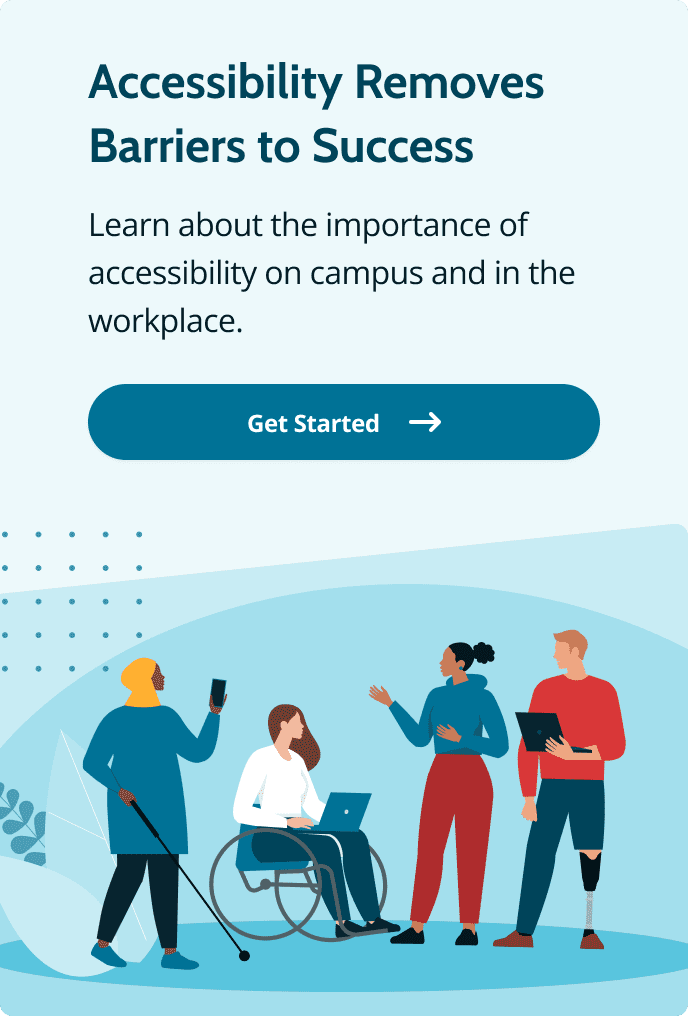How to Access College Disability Services and Accommodations
- Early on, visit your campus’s disability services office to prepare for your first day.
- Colleges are required to provide reasonable accommodations for disabled students.
- Colleges aren’t required to provide the same disability services you received in high school.
- Some schools will not approve accommodation requests without proper medical documentation.
If you’re among the 1 in 5 college students that lives with a disability, you may be wondering what your rights are and how you can ensure the college will honor them.
U.S. colleges and universities cannot legally discriminate against people with disabilities and are required to provide certain accommodations. Nearly all college campuses offer an array of services to ensure they support these students.
While a school’s office of disability services must provide basic disability access, such as accessible facilities and services, students must request these accommodations to receive them. Stephanie Dawson, the Director of the Miller Center for Student Disability Services at Miami University, asserts that “Accommodation planning is an interactive, ongoing and creative process so it is critical that students develop skills to participate in co-creating access plans.”
In this guide, we explain how to request college disability accommodations from disability services so you can improve your chances of academic success.
What Is the Importance of Disability Services?
The Americans with Disabilities Act (ADA) prohibits discrimination against disabled Americans and ensures they receive equal access to public services like higher education.
Equal access means that students who disclose their disabilities to their colleges and universities will receive reasonable accommodations, or modifications, which make educational environments accessible for students with disabilities.
Disability services offices ensure postsecondary institutions meet their required goals to provide access to students with disabilities.
“Colleges have a responsibility to create an environment that is marked by inclusive excellence and reflects back the larger society. Disability is an aspect of human diversity and it is important that students with disabilities have an accessible experience to fully engage in intellectual and campus life.”

— Stephanie Dawson, Director of the Miller Center for Student Disability Services at Miami University
When a student with a disability contacts disability services, they’re usually paired with a provider. Working with the student, a provider typically performs an assessment to help the learner determine what accommodations are available.
Providers also work with instructors and administrators to make sure the accommodations do not significantly alter or eliminate program requirements.
What Kinds of Disability Services Do Colleges Offer?
Students seeking college disability accommodations can usually find a variety of resources at their schools. When looking at colleges and universities, students and their families should contact the institutions’ student services and/or disability services offices to ask about disability accommodations and support.
Working with students, faculty members, and academic departments, disability services offices help learners receive timely access to support and handles requests related to physical, cognitive, learning, and other types of disabilities.
Some of the most common types of accommodations include the following:
- Sign language interpreters
- Test-taking accommodations, such as extended time and alternative formats
- Note-takers/scribes
- Course substitutions and/or waivers
- Wheelchair ramps and elevators
- Special parking spaces
5 Steps to Request College Disability Accommodations
Most colleges have a formal step-by-step process for requesting and receiving disability accommodations for campus-based learning. These are reviewed below.
1 Register on Campus as a Student With a Disability
Dawson recommends that, “Students should first ensure they are making contact with the appropriate office so holistic access planning can occur. In some cases, students may make informal arrangements without realizing there is a dedicated office that can provide support and advocacy.”
To register as a student with a disability and receive college disability services, reach out to the disability services access center. You can typically set up an in-person or virtual meeting with a representative to review your disability, the types of accommodations you’ve previously received, and the services available to you.
Just because you received a specific accommodation in high school does not mean you will receive the same accommodation in college. This is especially true if you lack proper documentation and proof of a disability.
2 Provide Proof of Your Disability
Before providing any type of accommodation, colleges and universities will ask you to provide proper documentation of your disability. This may include a recent medical report or a psychological evaluation, depending on the nature of your disability. If you have a visual impairment, for instance, an ophthalmologist or other vision expert can provide documentation.
If you participated in an individualized education program in high school, this document can help identify the type of accommodations you may need; however, it will not suffice as proof of a disability.
In the case of short-term disabilities, such as a broken or dislocated limb, you typically do not need additional documentation other than proof of your visit to a medical facility.
3 Meet With a Disability Services Office Representative
After gathering all the documentation required to seek accommodations, make an official appointment with a college disability services representative. In this meeting, you’ll provide your documentation and concrete details about the challenges you face with your disability. You’ll also discuss the type of accommodations you need in order to thrive in college.
This might feel like a somewhat invasive process. Remember that all healthcare documentation and conversations are considered private and should not be accessible to others without your consent. If you’re worried about your privacy, ask a staff member how your information will be kept secure.
4 Notify Professors of Your Eligibility for Accommodations
After receiving confirmation of eligibility from the disability services office, notify your professors to start setting up accommodations. Your confirmation will typically come in the form of a letter, but you may receive an email in place of or in addition to a letter. You can then provide this documentation to your instructors.
Some students may wish to keep the details of their needs and requests for accommodations more private. In that case, you can set up a one-on-one meeting during a professor’s office hours.
5 Regularly Remind Instructors Whenever You Need Accommodations
Despite providing accommodation documentation, it may still be necessary to advocate for yourself and remind your professors about the services available to you.
Professors who teach multiple courses with large classes may struggle to remember each student’s situation while balancing all their duties and obligations. Nonetheless, it’s an important part of a professor’s job to make the appropriate accommodations for students.
Accommodations vs. Modifications for College Students
What if you don’t need an accommodation — you need to change what you learn to be successful in college? Then, you could talk to the disability services office about modifications.
Modifications are changes to the curriculum for students with disabilities. For example, an accommodation on a test might be to allot the student more time. A modification to a test would be to change the number of questions the student must complete.
Whereas college students with disabilities have rights to accommodations under the ADA, colleges aren’t required to grant modifications. But that doesn’t mean you can’t ask about them. Even if your college won’t grant a modification, they might give you different accommodations that will help you.

What to Do If Your Accommodations Change
Many students with disabilities arrive on campus with the appropriate documentation and resources to get the services they need; however, others may not recognize their needs until they’re in college. Likewise, the accommodations that worked for you in high school or earlier may no longer suffice.
If you start college and realize you need additional support, speak with your academic advisor, your school’s disability services office, or an instructor. Professors can be a key resource in helping you access essential services, as they regularly evaluate your class performance and may have a clearer understanding of what accommodations could benefit you.
Most universities require instructors to put a “reasonable accommodation” notification on their syllabi with information about accessing disability services. Many professors emphasize and repeat this information early on in the semester to help students feel comfortable approaching them should the need arise.
Frequently Asked Questions About College Disability Services
How do you define disability?
Disability is a social construct with multiple definitions. The ADA defines disability as “a physical or mental impairment that substantially limits one or more major life activity.”
The ADA follows the medical model, which sees disability as an impairment that lives within a person’s mind or body.
Many disabled people follow the social model of disability, created by disability rights advocates in the 1970s and 1980s. The social model proposes that the designs and attitudes of society cause disablement, not medical conditions.
Disability is alleviated by inclusion efforts like appropriate accommodations, which place the burden on society, rather than the individual, to change. The social model is inclusive.
What are examples of reasonable accommodations?
Reasonable accommodations include small adjustments like allowing students to use smartphones or tape recorders to record lectures and extending test time.
Some accommodations may require the removal of physical barriers like dimming lights, or allowing students to take their tests in alternate environments like quiet rooms or using alternate test formats.
Instructors may, for example, allow students to give an oral rather than a written exam or use assistive listening devices.
Students may request alternative formats for written tests and study materials like Braille, large print, or audiotape readers.
Instructors might permit the use of spell checkers, dictionaries, or thesauruses for tests that aren’t designed to measure spelling skills.
What happens if your request for disability accommodations is denied?
Contact your disability services representative to learn why they denied your accommodations request. Disability services should help you resolve this problem.
Disability accommodations are usually denied when students have not supplied enough information about their disabilities. You might need to provide documentation from your health provider or a previous school where you received accommodations.
Also contact your high school, parents, or mental health or medical provider if you need a reminder of what’s worked for you in the past.
When should you request college disability accommodations?
Students should request accommodations directly after they’ve received their letters of acceptance. Disability services may need time to organize these accommodations.
You may also need time to appeal if disability services denies your request. Or you may need time to contact your parents, providers, or high school.
In any case, students should start gathering their documents and researching the college early. Search for disability services on the college’s website. You might also search for “accommodations” or the ADA.
With Contributions From:

Stephanie Dawson is the Director of the Miller Center for Student Disability Services at Miami University and a University of Cincinnati Alumna. She holds a Master of Social Work and is passionate about mobilizing teams to innovate accessibility practices and advance inclusion for people with disabilities. Her expertise includes leveraging technology to streamline access to disability accommodations, faculty support and education, institutionalizing accessibility best practices and supporting organizations in reimagining service delivery through a social justice lens.




